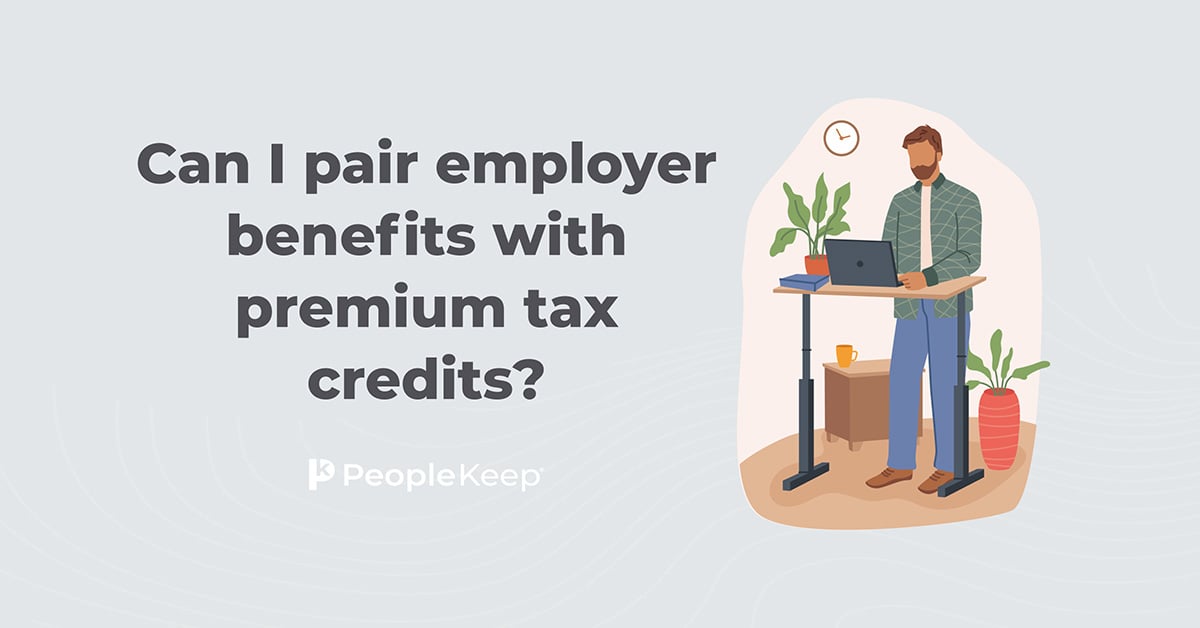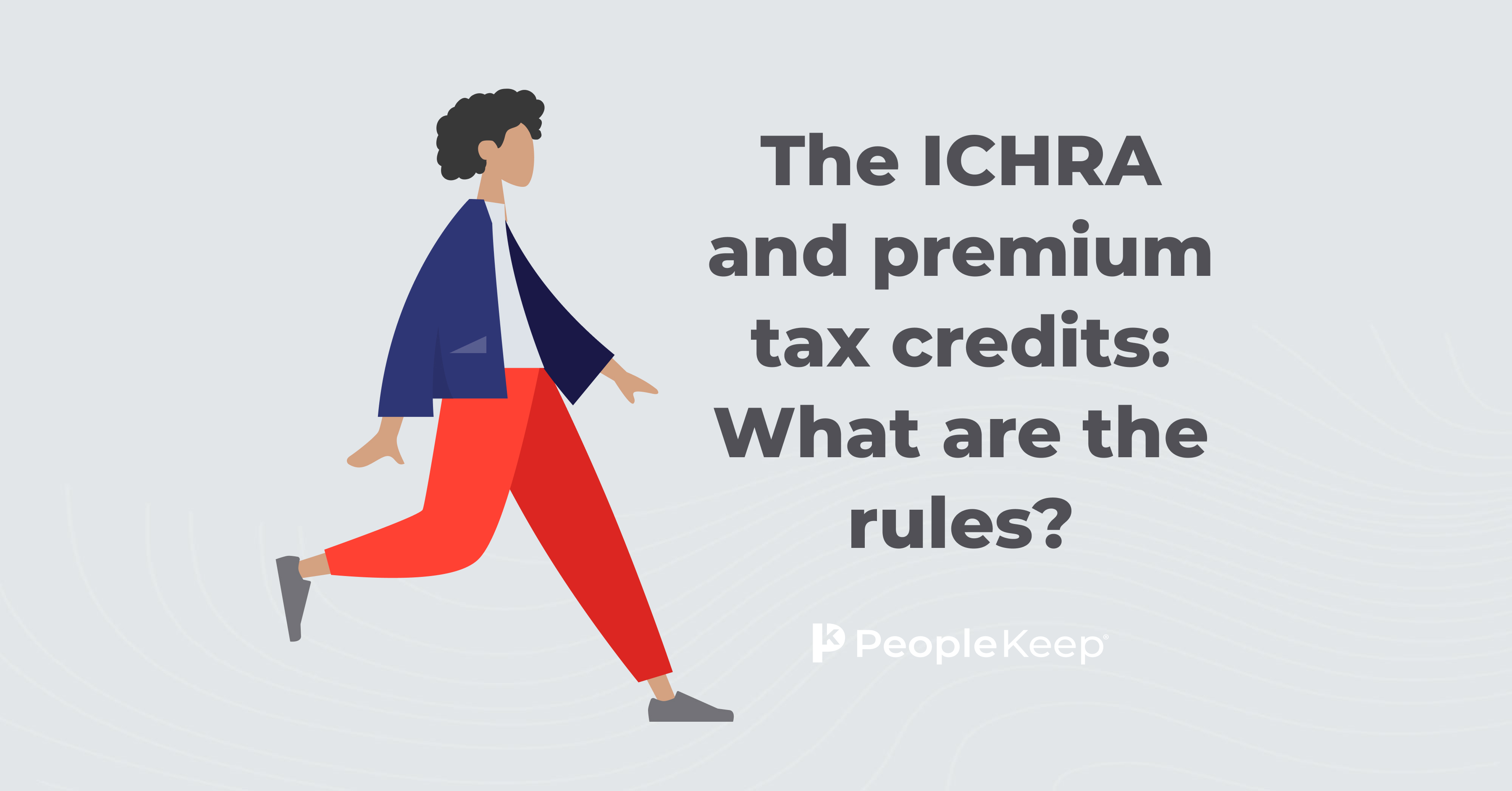Pros and cons of the individual coverage HRA
By Elizabeth Walker on April 21, 2025 at 10:00 AM
Many employers still approach health benefits with a one-size-fits-all mindset. But, today’s employees expect customization and flexibility. That shift in expectations and the rising cost of group health plans have boosted the popularity of health reimbursement arrangements (HRAs), particularly the individual coverage HRA (ICHRA).
Since 2020, the ICHRA has allowed employers to offer personalized health coverage as a viable alternative to a traditional group health plan. As a modern approach to employer-sponsored health benefits, the ICHRA is a good fit for businesses trying to control healthcare costs while providing a competitive benefit that their employees love.
But all health benefits have pros and cons, and the ICHRA is no exception. We'll review the benefits and drawbacks of the ICHRA so you can determine if it’s right for your company.
In this blog post, you’ll learn:
- What an ICHRA is and how it works for employers and employees.
- The pros and cons of offering an ICHRA as a comprehensive coverage option.
- How to know if an ICHRA is a good choice for your organization.
What is an ICHRA?
An ICHRA is a flexible and affordable employer-funded health benefit. It allows businesses of any size to reimburse employees tax-free for their individual health insurance policy premiums and other qualified healthcare expenses. By offering an ICHRA, employers can forgo offering a traditional group health insurance plan. Instead, employees can choose their own qualified health plan that works best for them on the individual insurance market.
Like other types of HRAs, an ICHRA is simple in its plan design. Employers choose a monthly allowance for employees to spend on premiums and out-of-pocket medical expenses. After employees submit proof of an eligible expense, the employer approves it and reimburses them up to their available HRA allowance.
ICHRAs also have tax advantages for employers and employees. For employers, they’re tax-deductible and free of payroll tax. Employees don’t have to pay income taxes on reimbursement amounts. To participate in an ICHRA, employees need individual health insurance that provides minimum essential coverage (MEC).
The best part about an ICHRA is that it allows for employee personalization. Employees aren't subject to one-size-fits-all health insurance chosen by their employers. Instead, it empowers employees to control their healthcare decisions.
What are the pros of an ICHRA?
The ICHRA is a popular healthcare option among employers for several reasons. Below are three of their key benefits.
1. There are no contribution limits or participation requirements
Unlike the qualified small employer HRA (QSEHRA), the ICHRA has no annual contribution levels. Businesses can offer their employees as much of an allowance as they choose. There are also no minimum monthly limits, so smaller companies on a fixed healthcare budget can pick an allowance that works for their organization. However, an ICHRA allowance must be affordable for applicable large employers (ALEs) to satisfy the employer mandate.
There are also no minimum participation requirements with the ICHRA. Most traditional group health plans require employers to maintain a participation rate of around 70%. But with an ICHRA, if an eligible employee decides not to use the benefit, there's no negative impact on the cost of healthcare coverage or added penalty for you.
2. You can customize allowances and eligibility by using employee classes and family status
Like the integrated HRA, employers can offer different monthly allowances to different employee classes with an ICHRA. Setting employee classes allows for greater personalization and customization of tax-free reimbursement amounts for your employees. Varying monthly allowances can also help you control your health benefits budget.
ICHRAs have 11 job-based employee class options, such as:
- Full-time and part-time employees
- Hourly workers
- Seasonal employees
- Temporary employees
- Geographic location
Different classes of employees can have different allowances. However, those within the same class of employees must receive the same allowance.
If you administer your ICHRA through PeopleKeep by Remodel Health, only the following employee classes are available:
- Full-time
- Part-time
- Salaried
- Hourly
- Seasonal
- State-based
- A combination of any of the above classes
If you’re looking to customize an ICHRA with one of the other allowed employee classes, Remodel Health’s ICHRA+ administration platform can help.
You can use employee classes to customize benefit eligibility rules as well. For example, you could offer an ICHRA to only full-time workers or part-time employees. You can also offer traditional group health insurance to classes of employees who aren’t receiving the ICHRA (such as providing a group plan to full-time employees and an ICHRA to part-time workers). However, you can’t give employees a choice between the two benefits.
You can also customize allowances by family status, such as single or married. You can also differ allowances by age, and you can contribute up to 3 times more to your oldest employee than to your youngest. While Remodel Health’s PeopleKeep product doesn’t support age-based allowances, our ICHRA+ product does.
3. They can satisfy the employer mandate
If you have more than 50 full-time equivalent employees (FTEs), the Affordable Care Act's (ACA) employer mandate considers you an ALE. This means larger employers must offer affordable health insurance coverage to 95% of their full-time workers and their dependents. The ICHRA can fulfill the mandate depending on how you set your allowance.
For 2026, an ICHRA is affordable if an employee pays (after the HRA reimbursement) no more than 9.96% of their annual household income for the lowest-cost silver plan on their local health exchange. Your allowance must be greater than or equal to this threshold. If the allowance is less than that, the ICHRA is unaffordable, and you may have to pay a penalty. Penalties only apply if at least one employee purchases an individual health policy from a public exchange and accepts premium tax credits.
Affordability standards are critical if you’re an ALE considering an ICHRA. To make it easier for you, you can calculate ICHRA affordability using IRS-established safe harbors.
What are the cons of an ICHRA?
We've covered many advantages of ICHRAs. But, understanding the cons can help businesses determine if the health benefits plan is genuinely right for them. Let's look at a few downsides of the ICHRA that employers should consider before deciding.
1. They may come with a learning curve
Transitioning from group health insurance to an ICHRA can initially be challenging for everyone. Employees familiar with group coverage may experience a potentially complex learning curve.
There may be confusion about submitting eligible medical expenses or how employers provide tax-free reimbursements. Your staff might also have to shop for their own individual health insurance plans, which might be their first time shopping on a public or private exchange.
Many employees may find this switch from their familiar group health plan frustrating, making them initially unwilling to use their new ICHRA benefit. Some employers may also hesitate to switch to a new health benefit for fear of a decrease in employee morale.
But with effective communication and the proper education, you can quickly get your employees used to an ICHRA.
2. An ICHRA excludes traditional group plans and health sharing plans
To participate in ICHRA, employees need a qualified individual health insurance policy.
Eligible health coverage includes:
- Medicare Parts A and B, or Part C
- Individual health plan coverage bought on a public or private exchange
- Many student health insurance policies
- Catastrophic medical plans
Uninsured employees or those on a spouse's or parent’s group medical plan can’t participate in an ICHRA. If you have fewer than 50 employees and want these employees with coverage through a parent or spouse to be able to participate, then a QSEHRA might be a better fit. Employees with a health sharing plan, like Medi-Share and ministries, are also ineligible to use the benefit.
If an employee wants to participate in the ICHRA but doesn’t have the right coverage, don’t worry. When you offer an ICHRA, you trigger a special enrollment period (SEP). This gives your employees 60 days to shop for and enroll in a qualifying health plan so they can take advantage of the benefit.
3. Premium tax credit coordination is challenging
ICHRAs can be tricky if you’re not an ALE and many of your workers qualify for premium tax credits. Employees with an unaffordable allowance can opt out of the ICHRA and use their premium tax credit or waive their subsidy and participate in the ICHRA.
If your ICHRA is affordable, employees can opt out of their ICHRA benefit, but they won't be able to claim their premium tax credit. In this situation, it's best for your employees to opt into the ICHRA benefit. But if your ICHRA is unaffordable, employees can waive their ICHRA benefit and collect their premium tax credit.
If you’re an ALE, remember that you must offer an affordable allowance to satisfy the employer mandate.
Is the ICHRA right for my organization?
After reviewing its pros and cons, you may still be unsure about offering an ICHRA. Determining if an ICHRA is right for your organization depends on a few key factors.
1. Look at your company size and group health insurance policy
Suppose you’re an ALE frustrated with the financial risks of group health insurance. You’re not alone in this situation. But luckily, there’s a flexible solution. You can cancel your group health insurance and use an ICHRA to lower your monthly benefit costs while satisfying the employer mandate.
If you have fewer than 50 FTEs and have employees in different health insurance situations, a QSEHRA might be a better fit. A taxable health stipend could be a good choice if you employ a wide range of workers, including 1099 employees, and are looking for an informal benefit.
2. Consider your workforce
If you're a remote business owner trying to offer quality multi-state health plan coverage, an ICHRA is also right for you. You can offer group coverage to employees in a specific geographic location and an ICHRA to those in other states that don't have good group health insurance options. Or you can offer an ICHRA to all your remote workers—regardless of where they live.
Employees with an ICHRA can choose their individual plan, out-of-pocket expenses, and local providers, which keeps them satisfied and improves retention efforts.
3. Work with a benefits administration software provider
ICHRAs can seem daunting if you're considering them for the first time. But if you're worried about administering an affordable ICHRA, don't be. Unlike group health insurance, ICHRAs don't require businesses to act as a middleman between insurers and employees. This makes them less time-consuming to manage. But they’re even easier to administer if you have help.
With an HRA software solution like PeopleKeep by Remodel Health, you can manage your ICHRA in minutes each month. We provide compliance management, cloud-based document storage, and award-winning customer support so you can focus on running your business. Our team of experts even reviews employee reimbursement requests so you can rest easy knowing your ICHRA is following all federal regulations.
If you’re a group broker or an ALE looking for additional compliance support and white-glove customer service, Remodel Health’s ICHRA+ may be right for you.
Conclusion
Offering medical coverage to your employees always has pros and cons. While it may not work for every company, an ICHRA is a rising alternative to group health insurance that aligns with the diverse needs of today’s workforce. By empowering employees to choose their own health coverage and qualified expenses while helping employers with cost control, the ICHRA is a smarter way to invest in your people and your business.
Are you ready to offer an ICHRA to your employees? Book a call with a PeopleKeep HRA specialist now!
This article was originally published on February 12, 2019. It was last updated on April 21, 2025.
Check out more resources
See these related articles

What is a zero cost sharing plan?
In this blog, we go over what zero cost sharing plans are and what other health benefit options exist for those who don’t qualify.

Can I pair employer benefits with premium tax credits?
Discover if you can combine employer benefits with premium tax credits when it comes to health insurance. Get all the answers in this informative post.

The ICHRA and premium tax credits: what are the rules?
With an ICHRA, the allowance amount you offer your employees can impact their premium tax credit eligibility.



